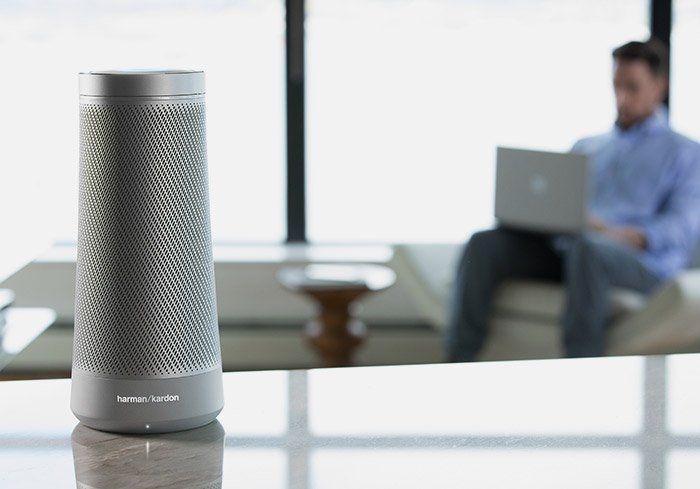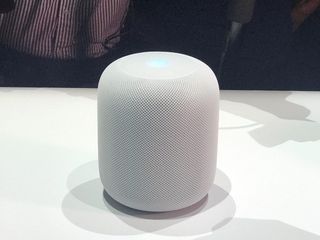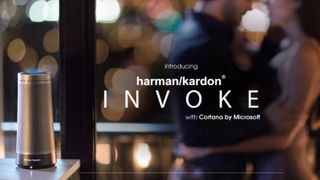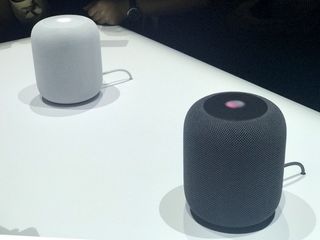
With a new speaker-hub combo coming from Apple, known as the HomePod, it's worth comparing Harman Kardon's similar upcoming device, the Invoke speaker. There are many similarities, with each speaker being designed to live in a certain ecosystem. The HomePod is powered by Apple's assistant Siri, while the Invoke has Microsoft's Cortana built in.
How do these two devices compare? Let's take a look to help you decide which is best for your needs.
What do these speakers do?
Both the HomePod and Invoke are designed to sit in the middle of your living area as a sort of wireless hub. They both play music, take commands, and connect with devices in your automated home.

The HomePod can apparently do anything Siri can, and the same is expected from Invoke and Cortana. The same commands you can use on your phone or computer, including setting important dates in a calendar, asking for directions to a party, and even changing the temperature of your connected thermostat, will be available here.
Both speakers have a far-field listening array to pick up your voice from a distance. The HomePod has six microphones, while the Invoke has seven microphones. In either case, they're designed so that you can change the song or dim the lights without having to leave your comfy spot on the couch.
Invoke will work directly with a wider range of music streaming services.
As of now, it appears the HomePod will only work with HomeKit accessories, while Invoke will apparently work with a wider range of smart-home devices. Likewise, HomePod is set to work with the Apple Music service, and Invoke is expected to work directly with Groove Music, Pandora, Spotify, iHeartRadio, and more.
Another thing Invoke has going for it that HomePod does not is Skype functionality. Through Invoke, you'll be able to call other Skype users, and you'll also be able to make calls to phones and landlines.
Get the Windows Central Newsletter
All the latest news, reviews, and guides for Windows and Xbox diehards.
Which speaker has better sound?
It's hard to tell which speaker has better sound at this point considering we haven't been able to use them side by side for a true comparison. But we can come up with an idea of how each one will sound. To be honest, Apple makes great hardware, and Harman Kardon is known for its quality speakers, so sound quality will likely be a near draw.
From a technical standpoint, the HomePod has seven beam-forming tweeters and a four-inch woofer. It also uses spatial awareness to decide how to best deliver sound in a specific room.
On the other hand, Invoke has three woofers and three tweeters, so you'll likely get a bit better bass than what is found in the HomePod. Again, this is speculation and we're only going with what the specs show us.
Are these speakers listening to you?

Yes, they're almost always listening as long as they have power. That's what allows you to call out a command from across the room.
Apple stated that no information is sent back to its servers unless the words "Hey, Siri" are spoken, and even then it is encrypted.
There is still no official word from Harman Kardon as to just how the information is treated, but it's likely in line with how Cortana treats your data now on other devices. In other words, by default, most of your data related to Cortana is collected and saved somewhere in the name of making your experience as good as possible.
Do you prefer Siri or Cortana?

Choosing a speaker based on the personal assistant you prefer will largely come down to whether you're already invested in the Apple or the Microsoft ecosystem.
Keep in mind that on top of Windows 10, you can set up Cortana on Invoke with an app for Android or iOS. It's doubtful there will be a way to set up or take full advantage of the HomePod if you're running Windows 10.
HomePod and Invoke pricing and availability

The Apple HomePod comes in white and space gray and will cost about $349. It is expected to be available in the U.S., the UK, and Australia in December 2017.
The Harman Kardon Invoke will be available in pearl silver and graphite colors, and it is expected to release in the U.S. only. As far as a price, there are only rumors at this point, but it's expected be available in the fall in the same $200 price range as the Amazon Echo.

Cale Hunt brings to Windows Central more than eight years of experience writing about laptops, PCs, accessories, games, and beyond. If it runs Windows or in some way complements the hardware, there’s a good chance he knows about it, has written about it, or is already busy testing it.